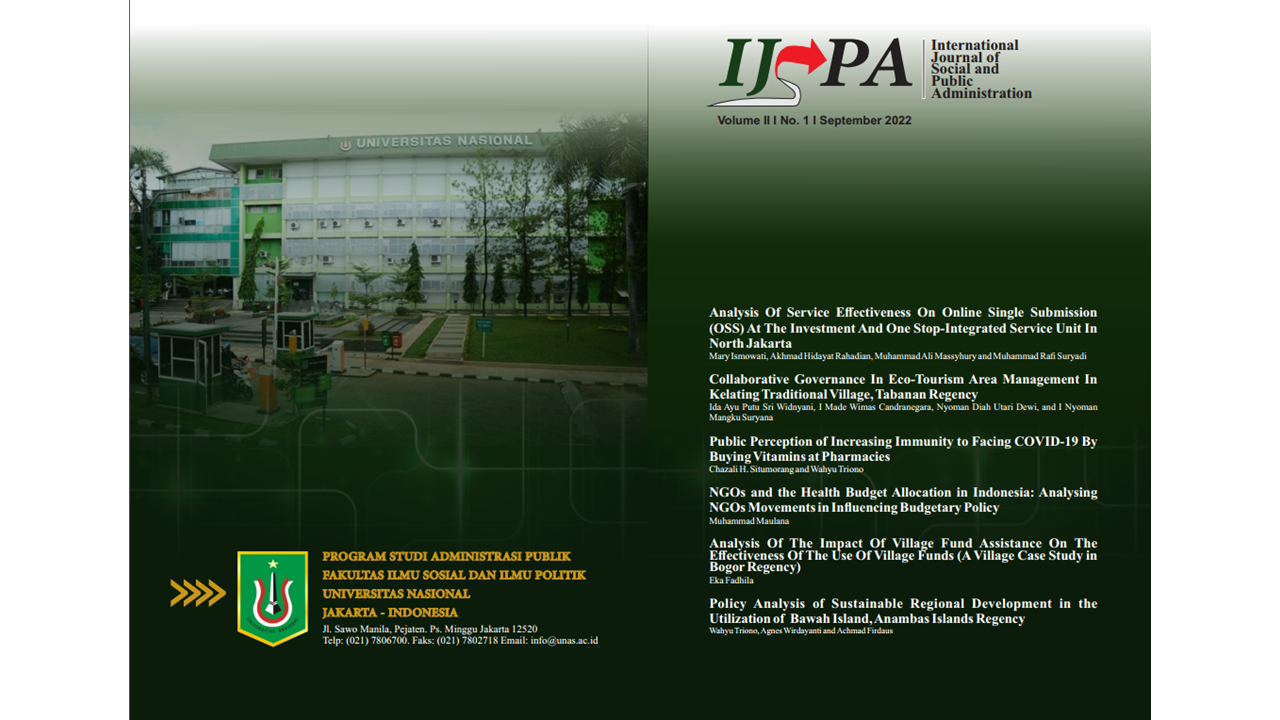Policy Analysis of Sustainable Regional Development in the Utilization of Bawah Island, Anambas Islands Regency
Abstract
The policy of sustainable regional development in the use of the Bawah Island of the Anambas Islands Regency is in accordance with the concept of sustainable regional development that is developing and applied in Indonesia in terms of the research “Analysis of Sustainable Regional Development Policy in the Utilization of the Bawah Island of the Anambas Islands Regency.” The purpose of this study is to answer how the policy of sustainable regional development in the utilization of the Bawah Island of the Anambas Islands Regency, and what are the obstacles andinfluencing factors in the utilization of the Bawah Island of the Anambas Islands Regency. This research method is called descriptive qualitative research (Creswell, 2008). The results of this study indicate that the use of the Bawah Island as a sustainable regional development policy is in
accordance with the objectives of the Sustainable Development Goals (SDGs) and, based on the constraints and influencing factors in the utilization of the Bawah Island on infrastructure aspects, health aspects (Covid-19), legal aspects, economic aspects, regional income and labor,
and cultural aspects, is in line with the policy process: Policy Determinants Policy Impact and Policy Content.
References
Abdoellah, Awan Y, & Rusfiana, (2016) Teori dan Analisis Kebijakan Publik. Penerbit Alfabeta, Bandung.
Budiman, (2021) Manajemen Pembangunan Wilayah. Penerbit FISIP UIN SGD Press, Bandung.
Creswell, J. W. (2010). Research design: pendekatan kualitatif, kuantitatif, dan mixed. Yogjakarta: PT Pustaka Pelajar.
Dunn, William N. (2003). Pengantar Analisis Kebijakan Publik. Gadjah Mada University Press, Yogyakarta.
Ealau dan Pewitt. (1986) Kebijakan Publik. Jakarta: Handal Niaga Pustaka, Jakarta.
Edi Suharto (2014), Analisis Kebijakan Publik, Alfabeta, Bandung, 2014.
Edi Suharto. (2008). Kebijakan Sosial Sebagai Kebijakan Publik. Alfabeta, Bandung.
Gary Anderson, Nancy Arsenault. (1998). Fundamentals of Educational Research. 2nd Edition, The Falmer Press, Philadelphia.
L. R. Gay, Geoffrey E. Mills, Peter Airasian. (2009). Educational Research: Competencies for Analysis and Applications 9 th, Pearson Education. New Jersey.
Loka Kawasan Konservasi Perairan Nasional (KKPN) Pekanbaru, (2015). Profil Pengelolaan Taman Wisata Perairan Pieh dan Anambas. Pekanbaru, Ditjen Pengelolaan Ruang Laut Kementerian Kelautan dan Perikanan.
Laporan Penelitian, (2019). Pulau Kecil dan Hak Asasi Manusia Catatan Situasi HAM di Tiga Pulau Kecil (P. Bangka, P. Sunut, P. Romang). Komisi Untuk Orang Hilang dan Korban Tindak Kekerasan, Jakarta.
Meutia, Intan Fitri. (2017). Analisis Kebijakan Publik. AURA (CV. Anugrah Utama Raharja), Bandar Lampung.
Moeliono, Anton M. (2007). Kamus Umum Bahasa Indonesia. Balai Pustaka, Jakarta.
Pal, Leslie L. Beyond. (2012). Policy Analysis: Public Issue Management in Turbulent Times. Thomson Publication, Scarborough, Ontario Canada
Raco, J.R. (2010). Metode Penelitian Kualitatif. Jenis, Karakteristik dan
Keunggulannya. Penerbit PT. Gramedia Widiasarana, Jakarta, Indonesia, 2010.
Situmorang, Chazali H. (2016). Kebijakan Publik. Teori Analisis, Implementasi dan Evaluasi Kebijakan. SSDI Publishing, Depok.
Wallace, Walter L., Metode Logika Ilmu Sosial. Bumi Aksara, Jakarta, 1984.
Future Reading:
Garda Putra Megantara (2022) dengan penelitian Dampak Pariwisata Pulau Bawah Terhadap Sosial Ekonomi Masyarakat Kabupaten Kepulauan Anambas.
Published
How to Cite
Issue
Section
License
Authors who publish with this journal agree to the following terms:
- Authors retain copyright and grant the journal right of first publication with the work simultaneously licensed under a Creative Commons Attribution License that allows others to share the work with an acknowledgment of the work's authorship and initial publication in this journal.
- Authors are able to enter into separate, additional contractual arrangements for the non-exclusive distribution of the journal's published version of the work (e.g., post it to an institutional repository or publish it in a book), with an acknowledgment of its initial publication in this journal.
- Authors are permitted and encouraged to post their work online (e.g., in institutional repositories or on their website) prior to and during the submission process, as it can lead to productive exchanges, as well as earlier and greater citation of published work (See The Effect of Open Access).

